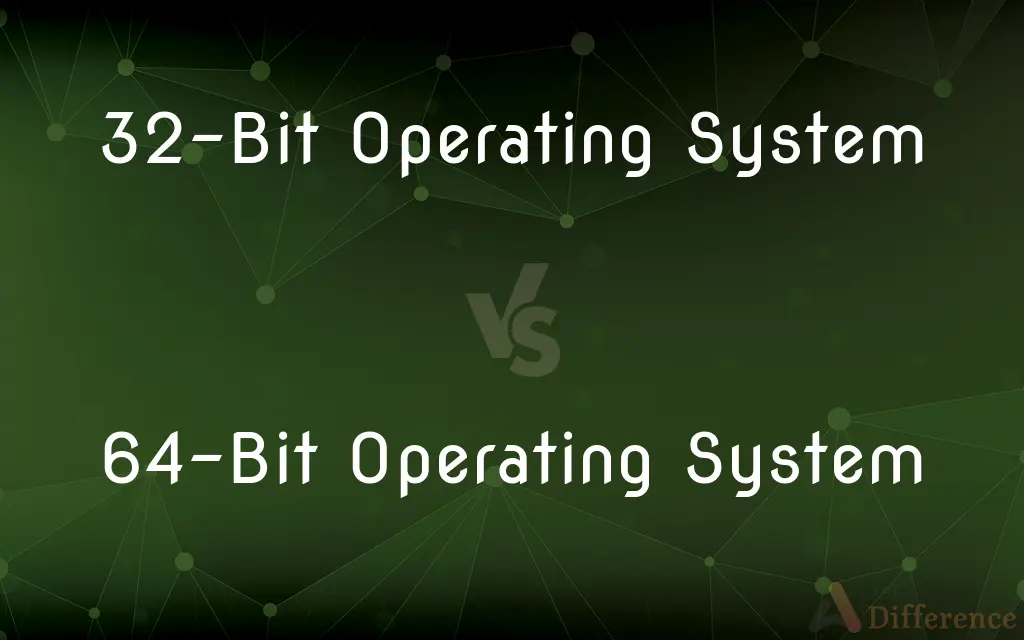32-Bit Operating System vs. 64-Bit Operating System — What's the Difference?
By Tayyaba Rehman — Published on January 11, 2024
A 32-bit OS processes data in 32-bit chunks, limiting memory to 4GB, while a 64-bit OS handles 64-bit data, allowing more than 4GB.

Difference Between 32-Bit Operating System and 64-Bit Operating System
Table of Contents
ADVERTISEMENT
Key Differences
A 32-bit operating system is designed to utilize data and memory addresses in 32-bit chunks. This inherently limits the maximum addressable memory to 4 GB, which constrains the amount of RAM the system can use effectively. In contrast, a 64-bit operating system can handle 64-bit chunks of data, exponentially increasing the amount of memory it can address, far exceeding the 4 GB limit.
The 32-bit operating system was standard in the era when computers had significantly less RAM, and the hardware requirements for applications were lower. As a result, 32-bit systems are now generally considered outdated for most modern computing needs. The 64-bit operating system has become the standard for modern computers, supporting larger amounts of RAM, which is necessary for contemporary applications, including gaming, video editing, and large databases.
In terms of software compatibility, a 32-bit operating system can run most 32-bit applications, but it cannot run 64-bit software. On the other hand, a 64-bit operating system is typically capable of running both 32-bit and 64-bit applications, thanks to the backward compatibility features built into the 64-bit processors and OS architectures.
For performance, 32-bit operating systems are typically slower and less efficient at handling large datasets compared to 64-bit systems. The latter can perform more calculations per second, handle larger files, and operate more efficiently with applications that require high memory bandwidth, which is why 64-bit systems are preferred for high-performance computing tasks.
Finally, the choice between a 32-bit and a 64-bit operating system can affect system security. A 64-bit OS can provide enhanced security features, such as Kernel Patch Protection and hardware-backed data execution prevention, which are not as robust or not available in a 32-bit environment.
ADVERTISEMENT
Comparison Chart
Memory Addressing
Limited to 4GB of RAM
Can address more than 4GB of RAM
Data Handling
Processes data in 32-bit chunks
Processes data in 64-bit chunks
Software Compatibility
Cannot run 64-bit software
Can run both 32-bit and 64-bit software
Performance
Less efficient with large data sets
More efficient and faster processing
Security Features
Fewer advanced security features
More robust security capabilities
Compare with Definitions
32-Bit Operating System
Limited by memory addressing.
A 32-bit OS can't use more than 4GB of RAM due to its addressing limit.
64-Bit Operating System
Handles 64-bit data processing.
My new computer runs on a 64-bit operating system.
32-Bit Operating System
Supports up to 4GB RAM.
Upgrade your RAM to 4GB if you have a 32-bit operating system.
64-Bit Operating System
Standard for current PCs.
Most systems today come with a 64-bit operating system installed.
32-Bit Operating System
Predominantly for legacy systems.
Her computer still operates on a 32-bit system.
64-Bit Operating System
Expands memory addressing.
The 64-bit OS can address more memory, enhancing performance.
32-Bit Operating System
Utilizes 32-bit data width.
The old laptop uses a 32-bit operating system.
64-Bit Operating System
Suited for modern applications.
A 64-bit operating system is required for the latest software.
32-Bit Operating System
Compatible with older hardware.
This 32-bit OS runs well on my vintage PC.
64-Bit Operating System
Enables extensive RAM usage.
With a 64-bit OS, you can utilize 16GB of RAM.
Common Curiosities
What does a 32-bit OS mean?
It refers to an OS that processes data in 32-bit pieces and can address up to 4GB of RAM.
Why do most new PCs use a 64-bit OS?
For greater performance, security, and future-proofing.
Can I run a 64-bit OS on a 32-bit processor?
No, 64-bit OS requires a 64-bit processor.
Does a 64-bit OS improve performance?
Yes, especially for applications that handle large amounts of data.
Are there security benefits to a 64-bit OS?
Yes, it often has more advanced security features.
What's the RAM limit for a 32-bit Windows OS?
Windows 32-bit is limited to 4GB of RAM.
What does 64-bit OS mean?
It denotes an OS capable of processing 64-bit data and using more than 4GB of RAM.
Can a 32-bit OS run 64-bit programs?
No, it can only run 32-bit programs.
How much RAM can a 64-bit OS theoretically use?
Up to 16 exabytes, but practical limits are much lower.
How can I tell if my OS is 32-bit or 64-bit?
On Windows, check 'System' in Control Panel; on Mac, check 'About This Mac'.
Can I upgrade from a 32-bit to a 64-bit OS?
Yes, if your hardware supports it, but a clean install is required.
Is Linux available in both 32-bit and 64-bit versions?
Yes, but newer distributions are phasing out 32-bit support.
If I have less than 4GB RAM, is a 32-bit OS better?
Not necessarily, a 64-bit OS may still offer performance benefits.
Do I need a 64-bit OS for gaming?
Yes, modern games often require a 64-bit OS.
Will my old peripherals work with a 64-bit OS?
Most should, but check for driver compatibility.
Share Your Discovery

Previous Comparison
Neuroscientist vs. Neurologist
Next Comparison
All-Wheel Drive vs. Four-Wheel DriveAuthor Spotlight
Written by
Tayyaba RehmanTayyaba Rehman is a distinguished writer, currently serving as a primary contributor to askdifference.com. As a researcher in semantics and etymology, Tayyaba's passion for the complexity of languages and their distinctions has found a perfect home on the platform. Tayyaba delves into the intricacies of language, distinguishing between commonly confused words and phrases, thereby providing clarity for readers worldwide.
















































